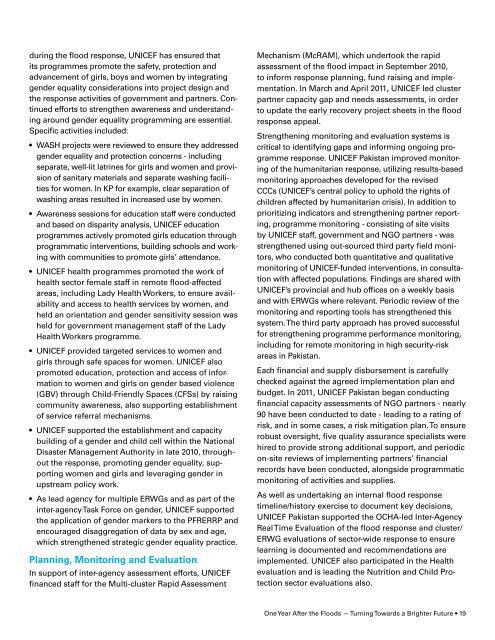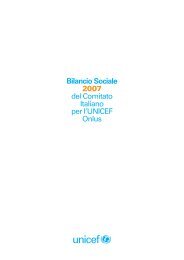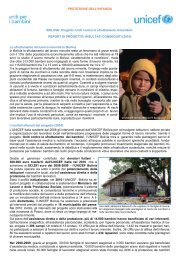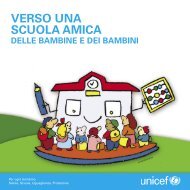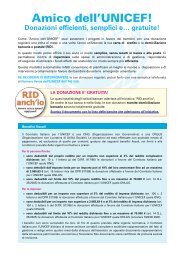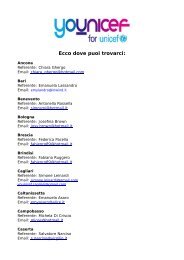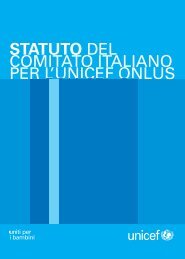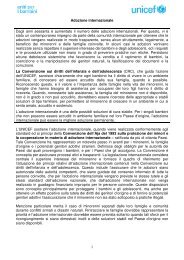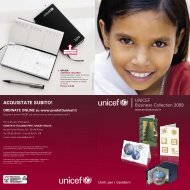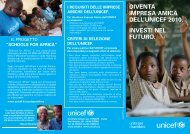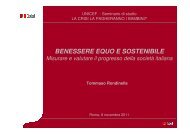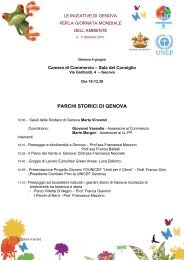Pakistan 1 Year Report - UNICEF Humanitarian Action Resources
Pakistan 1 Year Report - UNICEF Humanitarian Action Resources
Pakistan 1 Year Report - UNICEF Humanitarian Action Resources
You also want an ePaper? Increase the reach of your titles
YUMPU automatically turns print PDFs into web optimized ePapers that Google loves.
during the flood response, <strong>UNICEF</strong> has ensured thatits programmes promote the safety, protection andadvancement of girls, boys and women by integratinggender equality considerations into project design andthe response activities of government and partners. Continuedefforts to strengthen awareness and understandingaround gender equality programming are essential.Specific activities included:• WASH projects were reviewed to ensure they addressedgender equality and protection concerns - includingseparate, well-lit latrines for girls and women and provisionof sanitary materials and separate washing facilitiesfor women. In KP for example, clear separation ofwashing areas resulted in increased use by women.• Awareness sessions for education staff were conductedand based on disparity analysis, <strong>UNICEF</strong> educationprogrammes actively promoted girls education throughprogrammatic interventions, building schools and workingwith communities to promote girls’ attendance.• <strong>UNICEF</strong> health programmes promoted the work ofhealth sector female staff in remote flood-affectedareas, including Lady Health Workers, to ensure availabilityand access to health services by women, andheld an orientation and gender sensitivity session washeld for government management staff of the LadyHealth Workers programme.• <strong>UNICEF</strong> provided targeted services to women andgirls through safe spaces for women. <strong>UNICEF</strong> alsopromoted education, protection and access of informationto women and girls on gender based violence(GBV) through Child-Friendly Spaces (CFSs) by raisingcommunity awareness, also supporting establishmentof service referral mechanisms.• <strong>UNICEF</strong> supported the establishment and capacitybuilding of a gender and child cell within the NationalDisaster Management Authority in late 2010, throughoutthe response, promoting gender equality, supportingwomen and girls and leveraging gender inupstream policy work.• As lead agency for multiple ERWGs and as part of theinter-agency Task Force on gender, <strong>UNICEF</strong> supportedthe application of gender markers to the PFRERRP andencouraged disaggregation of data by sex and age,which strengthened strategic gender equality practice.Planning, Monitoring and EvaluationIn support of inter-agency assessment efforts, <strong>UNICEF</strong>financed staff for the Multi-cluster Rapid AssessmentMechanism (McRAM), which undertook the rapidassessment of the flood impact in September 2010,to inform response planning, fund raising and implementation.In March and April 2011, <strong>UNICEF</strong> led clusterpartner capacity gap and needs assessments, in orderto update the early recovery project sheets in the floodresponse appeal.Strengthening monitoring and evaluation systems iscritical to identifying gaps and informing ongoing programmeresponse. <strong>UNICEF</strong> <strong>Pakistan</strong> improved monitoringof the humanitarian response, utilizing results-basedmonitoring approaches developed for the revisedCCCs (<strong>UNICEF</strong>’s central policy to uphold the rights ofchildren affected by humanitarian crisis). In addition toprioritizing indicators and strengthening partner reporting,programme monitoring - consisting of site visitsby <strong>UNICEF</strong> staff, government and NGO partners - wasstrengthened using out-sourced third party field monitors,who conducted both quantitative and qualitativemonitoring of <strong>UNICEF</strong>-funded interventions, in consultationwith affected populations. Findings are shared with<strong>UNICEF</strong>’s provincial and hub offices on a weekly basisand with ERWGs where relevant. Periodic review of themonitoring and reporting tools has strengthened thissystem. The third party approach has proved successfulfor strengthening programme performance monitoring,including for remote monitoring in high security-riskareas in <strong>Pakistan</strong>.Each financial and supply disbursement is carefullychecked against the agreed implementation plan andbudget. In 2011, <strong>UNICEF</strong> <strong>Pakistan</strong> began conductingfinancial capacity assessments of NGO partners - nearly90 have been conducted to date - leading to a rating ofrisk, and in some cases, a risk mitigation plan. To ensurerobust oversight, five quality assurance specialists werehired to provide strong additional support, and periodicon-site reviews of implementing partners’ financialrecords have been conducted, alongside programmaticmonitoring of activities and supplies.As well as undertaking an internal flood responsetimeline/history exercise to document key decisions,<strong>UNICEF</strong> <strong>Pakistan</strong> supported the OCHA-led Inter-AgencyReal Time Evaluation of the flood response and cluster/ERWG evaluations of sector-wide response to ensurelearning is documented and recommendations areimplemented. <strong>UNICEF</strong> also participated in the Healthevaluation and is leading the Nutrition and Child Protectionsector evaluations also.One <strong>Year</strong> After the Floods — Turning Towards a Brighter Future • 19


